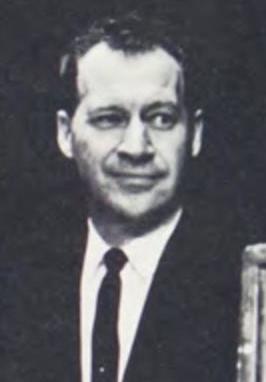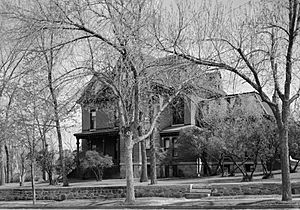Tim Babcock facts for kids
Quick facts for kids
Tim Babcock
|
|
|---|---|
 |
|
| 16th Governor of Montana | |
| In office January 25, 1962 – January 6, 1969 |
|
| Lieutenant | David James (Acting) Ted James |
| Preceded by | Donald Nutter |
| Succeeded by | Forrest Anderson |
| 22nd Lieutenant Governor of Montana | |
| In office January 2, 1961 – January 25, 1962 |
|
| Governor | Donald Nutter |
| Preceded by | Paul Cannon |
| Succeeded by | David James (Acting) |
| Member of the Montana House of Representatives | |
| Personal details | |
| Born |
Timothy Milford Babcock
October 27, 1919 Littlefork, Minnesota, U.S. |
| Died | April 7, 2015 (aged 95) Helena, Montana, U.S. |
| Political party | Republican |
| Spouse |
Betty Lee
(m. 1941; died 2013) |
Timothy Milford Babcock (born October 27, 1919 – died April 7, 2015) was an American politician. He served as the 16th Governor of the state of Montana from 1962 to 1969.
Contents
Early Life and Military Service
Timothy Babcock was born in Littlefork, Minnesota. His parents were Olive and Erwin Babcock. Later, his family moved to Glendive, Montana. He finished high school at Dawson County High School in 1939.
In 1941, he married Betty Lee. They had two children together. After high school, he worked at a factory that made airplanes in California.
In 1944, Tim Babcock joined the United States Army. He was an infantryman, which means he was a soldier who fought on foot. He served in Europe during World War II. He fought in important battles like Elsenborn Ridge, which was part of the Battle of the Bulge. He also helped capture the Remagen Bridge. For his bravery, he received a special award called the Bronze Star Medal.
Political Career in Montana
Before becoming governor, Babcock served three terms in the Montana Legislature. This is where state laws are made. In 1960, he was elected as the Lieutenant Governor of Montana. The lieutenant governor is like a vice-president for the state.
In 1962, the governor at the time, Donald Nutter, passed away. Tim Babcock then became the Governor of Montana. During his time as governor, he suggested a three-percent sales tax to help fund the state government. He also managed the state's spending plan.
In 1964, Babcock supported Barry Goldwater for president. However, Lyndon B. Johnson won the election that year. Babcock ran for governor again in 1964. He ran against Roland Renne, who used to be the president of Montana State College. It was a very close election, but Babcock won and was re-elected.
From 1964 to 1965, he was part of a group called the National Governors' Conference Executive Committee. This group helps governors work together. He also led the Western Governors' Conference from 1966 to 1967.
In 1966, he ran for a seat in the United States Senate but lost to Lee Metcalf.
When he ran for governor again in 1968, he first had to win against Ted James in his own party. Ted James had been his Lieutenant Governor. Babcock won that election. Then, he ran against Forrest H. Anderson, who was the state's top lawyer (Attorney General). Babcock lost this election.
After his time as governor, President Richard Nixon asked him to join a special committee about oceans and the atmosphere.
Later Life and Contributions
In 1969, Tim Babcock became a vice president at a company called Occidental Petroleum. He also worked as a lobbyist for the company. A lobbyist talks to government leaders to share a company's ideas and needs.
Babcock was chosen to be a delegate to the Republican National Convention eleven times. This is a big meeting where the Republican Party chooses its presidential candidate. He also served on the National Republican Committee in 1997 and 2000.
In 1978, Tim Babcock and his wife, Betty, wrote a book together called Challenges: Above & Beyond.
Personal Life and Legacy
In 1969, Babcock bought the Hauser Mansion in Helena. This historic house was built for a former governor, Samuel Thomas Hauser. It is now listed on the National Register of Historic Places.
Tim Babcock passed away in Helena, Montana on April 7, 2015, at the age of 95.
 | John T. Biggers |
 | Thomas Blackshear |
 | Mark Bradford |
 | Beverly Buchanan |


